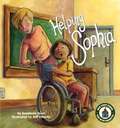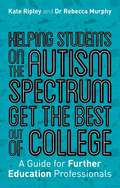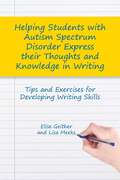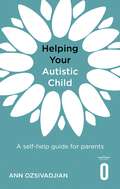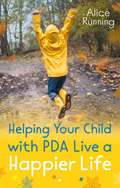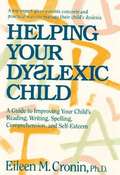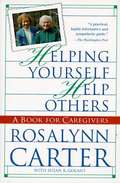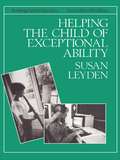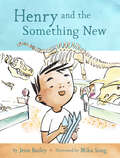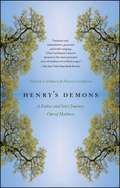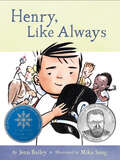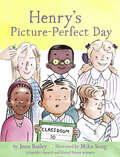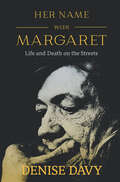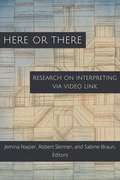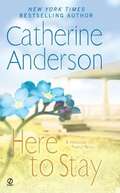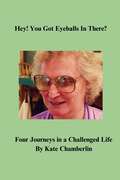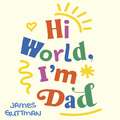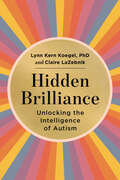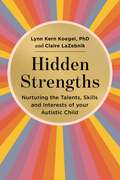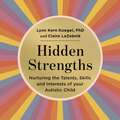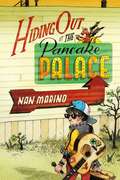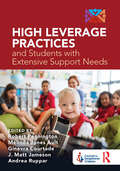- Table View
- List View
Helping Sophia
by Anastasia SuenThe students in Miss K's class experience situations that occur in schools everywhere. When Sophia's helper is absent, her fellow third-graders help out by learning how to push her wheelchair. Sophia's story teaches about caring, kindness, and children with disabilities with brilliant illustrations and humorous text. What Do You Think? quetions, Miss K's Classroom rules, and a glossary aid teachers in classroom discussions about the character trait of caring featured in this stunning picture book. Special thanks to content consultant Vicki F. Panaccione Ph. D.
Helping Students on the Autism Spectrum Get the Best Out of College: A Guide for Further Education Professionals
by Kate Ripley Rebecca MurphyThis is the companion guide for further education staff working with students on the autism spectrum who are using Getting the Best Out of College for Students on the Autism Spectrum: A Workbook for Entering Further Education.The workbook takes a holistic approach and focusses on the practicalities of college life for autistic students transitioning to further education, as well as those already there. It covers everything needed to support autistic students including getting to college, how to handle new sensory issues, peer relationships, where to go for help, time management, and exam anxiety.This guide follows the structure of the workbook Getting the Best Out of College for Students on the Autism Spectrum. For each chapter, there is a parallel chapter in the student guide that directly addresses the students' needs. This guide includes case studies, contextual information and frameworks to help adults work through the exercises and interactive elements with the student.
Helping Students with Autism Spectrum Disorder Express their Thoughts and Knowledge in Writing: Tips and Exercises for Developing Writing Skills
by Elise Geither Lisa M. MeeksWhen it comes to academic work, students with Autism Spectrum Disorder (ASD) often have the required knowledge but struggle to get their thoughts down in writing. This is a practical guide to teaching and improving writing skills in students with ASD to meet academic writing standards and prepare for the increased expectations of higher education. The book covers key considerations for all educators teaching writing skills to high school and college students with ASD including how to address difficulties with comprehension, executive functioning, and motor skills, how to structure ideas into a coherent argument, and how to develop creativity and expression in writing, as well as how to successfully adapt these skills to meet university expectations. Each chapter includes teaching tips, insightful student perspectives, and ready-to-use writing exercises.
Helping Your Autistic Child: A self-help guide for parents (Helping Your Child)
by Ann OzsivadjianPractical, evidence-based advice for managing distressed behaviours and common situations involving autistic children. Autism affects about one per cent of the population, and whilst it can present very differently among individuals, there are some common challenges faced by autistic people. This self-help guide focuses on practical, proven techniques to help parents support their autistic children with commonly experienced areas of difficulty. Written by authors with extensive experience in research and in working clinically with children with a wide range of neurodevelopmental differences, this book uses a strengths-based approach to guide parents in helping their children to enhance their skills, as well as to manage some common challenges.This book will help you to: · Support your child through anxiety and social interaction issues · Manage sleep problems and feeding difficulties · Understand sensory responses in autism · Understand and manage distressed behaviour, including self-harm and demand avoidanceHelping Your Child is a series for parents and caregivers to support children through developmental difficulties, both psychological and physical. Each guide uses clinically proven techniques. Series editors: Dr Polly Waite and Emeritus Professor Peter Cooper
Helping Your Autistic Child: A self-help guide for parents (Helping Your Child)
by Ann OzsivadjianPractical, evidence-based advice for managing distressed behaviours and common situations involving autistic children. Autism affects about one per cent of the population, and whilst it can present very differently among individuals, there are some common challenges faced by autistic people. This self-help guide focuses on practical, proven techniques to help parents support their autistic children with commonly experienced areas of difficulty. Written by authors with extensive experience in research and in working clinically with children with a wide range of neurodevelopmental differences, this book uses a strengths-based approach to guide parents in helping their children to enhance their skills, as well as to manage some common challenges.This book will help you to: · Support your child through anxiety and social interaction issues · Manage sleep problems and feeding difficulties · Understand sensory responses in autism · Understand and manage distressed behaviour, including self-harm and demand avoidanceHelping Your Child is a series for parents and caregivers to support children through developmental difficulties, both psychological and physical. Each guide uses clinically proven techniques. Series editors: Dr Polly Waite and Emeritus Professor Peter Cooper
Helping Your Child with PDA Live a Happier Life
by Alice RunningDrawing on the author's personal experience of parenting a child with PDA, this insightful and informative guide offers strategies and tips for all aspects of daily life, including sensory issues, education and negotiation.Full of advice and support, this book is not intended to provide information on how to change your children. Rather, it is focused on creating the type of environment that will allow children to be authentically themselves, thereby enabling them to flourish and thrive.
Helping Your Dyslexic Child: A Guide to Improving Your Child's Reading, Writing, Spelling, Comprehension, and Self-Esteem
by Eileen CroninCronin gives parents very clear descriptions of the behaviors which generally accompany the different presentations of dyslexia. Then, she outlines straightforward steps for capitalizing on the child's abilities A sensible and informative approach to coping with this set of learning challenges..
Helping Yourself Help Others: A Book for Caregivers
by Susan K. Golant Rosalynn CarterHaving cared at home for her ailing father and grandfather, Rosalynn Carter's involvement has taught her that Americans are in the middle of a caregiving crisis. In this book, Mrs. Carter addresses the social issues that have created this crisis and offers practical solutions to the problems caregivers typically experience, such as isolation, burnout, anger, and helplessness.
Helping the Child with Exceptional Ability (Special Education Ser.)
by Susan LeydenFirst Published in 1985. Routledge is an imprint of Taylor & Francis, an informa company.
Henry and the Something New: Book 2
by Jenn Bailey"Relatable characters, familiar scenarios, and gentle humor make this a remarkably satisfying read." —Horn Book Magazine, Starred Review From the creators of the Schneider Award-winning books A Friend for Henry and Henry, Like Always comes a delightful beginning chapter book about embracing new experiences, starring a sweet and sensitive child on the autism spectrum.It’s Field Trip Day! Henry's class is excited to visit the museum, but Henry is not so sure. The museum means maybe seeing dinosaurs, Henry's favorite. But it also means a lot of things that are new: a noisy school bus ride, a building full of echoes and hallways, and plenty of chances to get lost! Will he find something that makes all of this new worth the trip? Come along with Henry in this funny, bighearted tale about trying new things, exploring new places, and finding the courage to make yourself heard.JUST RIGHT FOR BEGINNING READERS: With short chapters and simple text, this book is perfect for newly independent readers who are just moving on to longer books.FIRST FIELD TRIP: This story will encourage and reassure any child beginning school or preparing to embark on their first field trip as Henry navigates the excitement (and potential anxiety) that comes with doing new things for the first time.GREAT BACK-TO-SCHOOL READ: Perfect for any reader starting a new school year, the Henry series explores common school experiences in a gentle, funny, and encouraging way. DIVERSE STORIES: Centering neurodivergent kids is vital to expanding diverse representation across books for all ages. The Henry series provides a mirror and a window for kids on the autism spectrum and their friends to see themselves in the stories they read.AN AWARD-WINNING TEAM: Jenn Bailey and Mika Song received a Schneider Family Book Honor Award for their picture book A Friend for Henry. See how the story continues in this classic-feeling early reader series based on the same character!Perfect for:Newly independent readersAn excellent resource for parents of kids on the spectrumLibrarians, teachers, and booksellers looking for a children’s book that offers a window into the experience of autismA reassuring read for kids with varying levels of social anxietyGift givers looking for a sweet and relatable book about trying new things
Henry's Demons: Living with Schizophrenia, A Father and Son's Story
by Patrick Cockburn Henry CockburnOn a cold February day two months after his twentieth birthday, Henry Cockburn waded into the Newhaven estuary outside Brighton, England, and nearly drowned. Voices, he said, had urged him to do it. Nearly halfway around the world in Afghanistan, journalist Patrick Cockburn learned from his wife, Jan, that his son had suffered a breakdown and had been admitted to a hospital. Ten days later, Henry was diagnosed with schizophrenia. Narrated by both Patrick and Henry, this is the extraordinary story of the eight years since Henry's descent into schizophrenia--years he has spent almost entirely in hospitals--and his family's struggle to help him recover. With remarkable frankness, Patrick writes of Henry's transformation from art student to mental patient and of the agonizing and difficult task of helping his son get well. Any hope of recovery lies in medication, yet Henry, who does not believe he is ill, secretly stops taking it and frequently runs away. Hopeful periods of stability are followed by frightening disappearances, then relapses that bleed into one another, until at last there is the promise of real improvement. In Henry's own raw, beautiful chapters, he describes his psychosis from the inside. He vividly relates what it is like to hear trees and bushes speaking to him, voices compelling him to wander the countryside or live in the streets, the loneliness of life within hospital walls, harrowing "polka dot days" that incapacitate him, and finally, his steps towards recovery. Patrick's and Henry's parallel stories reveal the complex intersections of sanity, madness, and identity; the vagaries of mental illness and its treatment; and a family's steadfast response to a bewildering condition. Haunting, intimate, and profoundly moving, their unique narrative will resonate with every parent and anyone who has been touched by mental illness.
Henry, Like Always: Book 1
by Jenn BaileyA Schneider Family Book Award Winner A Theodor Seuss Geisel Honor Book A NPR 2023 Books We Love Pick A School Library Journal Best Book of 2023 A 2023 Chicago Public Library Best of the Best Book A beginning chapter book series based on the award-winning picture book, A Friend for Henry!Henry likes Classroom Ten. He likes how it is always the same. But this week, Henry's class will have a parade, and a parade means having Share Time on the wrong day. A parade means playing instruments that are too loud. A parade means this week is not like always.Join Henry as he navigates the ups and downs of marker missiles, stomach volcanoes, and days that feel a little too orange. From the creators of the Schneider Family Honor-winning picture book A Friend for Henry, this warmly funny book starring a child on the autism spectrum is a reassuring read for school-bound kids of all stripes.GREAT FOR BEGINNING READERS: With short chapters and simple text, this book is perfect for newly independent readers who are just moving into longer books.BACK TO SCHOOL: Familiar school scenarios—from new schedules to making new friends—are portrayed with humor and understanding in this series that will appeal to and reassure any child starting or continuing in school.DIVERSE STORIES: Representing neurodivergent kids is a vital aspect of expanding diverse representation across books for all ages. Henry, Like Always provides a mirror and a window for kids on the autism spectrum and their friends to see themselves in the stories they read.AN AWARD-WINNING TEAM: Jenn Bailey and Mika Song were awarded a Schneider Family Honor Award for their picture book A Friend for Henry. See how the story continues in this classic-feeling early reader series based on the same character!Perfect for:Newly independent readersAn excellent resource for parents of kids on the spectrumLibrarians, teachers, and booksellers looking for a children's book that offers a window into the experience of autismA reassuring read for kids with varying levels of social anxietyGift-givers looking for a sweet and relatable book about friendship
Henry’s Picture-Perfect Day: Book 3
by Jenn BaileyThe third chapter book in the award-winning Henry series, starring a sweet and sensitive child on the autism spectrum, is a story about embracing life's messier moments and one’s own uniqueness.It is Picture Day for Classroom Ten! Mrs. Tanaka says that the class will take a perfect picture. And on Picture Day, everyone smiles. The trouble is that Henry does not feel perfect. His new shirt has stripes. He has never practiced smiling. And, worst of all, his front tooth is starting to wobble.Join Henry and the kids of Classroom Ten in this warm and funny tale of Picture Day pressure, loose tooth trouble, and learning what it truly means to make a day—and a memory—that is picture perfect. Part of the Schneider Family Award and Theodor Seuss Geisel Honor-winning series, this is a reassuring read for all school-age kids.JUST RIGHT FOR BEGINNING READERS: With short chapters and simple text, this book is perfect for newly independent readers who are just moving into longer books.GREAT BACK-TO-SCHOOL READ: Perfect for any reader starting a new school year, the Henry series explores common school experiences in a gentle, funny, and encouraging way. DIVERSE STORIES: Representing neurodivergent kids is a vital aspect of expanding diverse representation across books for all ages. The Henry series provides a mirror and a window for kids on the autism spectrum and their friends to see themselves in the stories they read.AWARD-WINNING TEAM: Jenn Bailey and Mika Song have received the Schneider Family Book Award and a Theodor Seuss Geisel Honor for their Henry stories. Follow along with each new adventure in this much-loved series!Perfect for:Newly independent readersAn excellent resource for parents of kids on the spectrumLibrarians, teachers, and booksellers looking for a children’s book that offers a window into the experience of autismA reassuring read for kids with varying levels of social anxietyGift-givers looking for a sweet and relatable book about new experiences
Her Name Was Margaret: Life and Death on the Streets
by Denise DavyAt age eighteen, Margaret Jacobson was admitted to the Ontario Hospital, later renamed the Hamilton Psychiatric Hospital. Years later, she died homeless and alone in the city. With meticulous research and deep compassion Denise Davy has pieced together Margaret's story – from promising student to patient, to homeless woman, to an unmarked grave – and asks us to look hard at the system that buried her there.
Here or There: Research on Interpreting via Video Link (Gallaudet Studies In Interpret #16)
by Robert Skinner Jemina Napier Sabine BraunThe field of sign language interpreting is undergoing an exponential increase in the delivery of services through remote and video technologies. The nature of these technologies challenges established notions of interpreting as a situated, communicative event and of the interpreter as a participant. As a result, new perspectives and research are necessary for interpreters to thrive in this environment. This volume fills that gap and features interdisciplinary explorations of remote interpreting from spoken and signed language interpreting scholars who examine various issues from linguistic, sociological, physiological, and environmental perspectives. Here or There presents cutting edge, empirical research that informs the professional practice of remote interpreting, whether it be video relay service, video conference, or video remote interpreting. The research is augmented by the perspectives of stakeholders and deaf consumers on the quality of the interpreted work. Among the topics covered are professional attitudes and motivations, interpreting in specific contexts, and adaptation strategies. The contributors also address potential implications for relying on remote interpreting, discuss remote interpreter education, and offer recommendations for service providers.
Here to Stay
by Catherine AndersonMandy Pajeck had a tough childhood. Now 28, she feels responsible for the accident that took her younger brother's sight. But his complete reliance on her care is making them both miserable. When she meets handsome Zach Harrigan and his mini guide horse, she thinks she's found the ticket to her brother's happiness--and maybe her own.
Hey! You Got Eyeballs In There?: Four Journeys in a Challenged Life
by Kate ChamberlinA collection of stories depicting the life and times of a blind girl as she experiences the challenges of being a young child, teenager, wife, mother, and grandmother. As she grows up, some of Grace’s stories are happy, some trying, some are enlightening, and a few journeys are sad, but they’re all the warp and weave of what goes into the tapestry of life we call Family. The daily living skills demonstrated by the fictional characters in these stories and in the Resource List are valid, tried, and true.
Hey, Nobody's Perfect
by Ann HerrickInsulting a guy in a wheelchair--is that any way to start a romance? Life was complicated enough for Sivia before Keeley came into her life. Her parent's divorce did not wipe out their traditional family values. Dad is still way too self-centered, Mom is still resentful, Russ is still shoving food in his mouth and Sivia doesn't need any more drama. But when the new student, obnoxious and legless Keeley, becomes her project partner, her life becomes even more complicated. Family friction, peer pressure and her overly controlling father are threats to her budding relationship-but prejudices she never knew she had and doesn't want to acknowledge are the biggest hurdle of all.
Hi World, I'm Dad: How Fathers Can Journey to Autism Awareness, Acceptance, and Appreciation
by James GuttmanRaising a non-verbal autistic kid is a rollercoaster - especially as a single dad.In this no-nonsense, often laugh-out-loud funny guide to parenting an autistic child, James Guttman shares everything he's learnt about fatherhood - including reckoning with traditional masculinity and care roles; creating a unique communication style with your autistic child; navigating relationships with family and community- and moving from autism acceptance to autism appreciation. With an exploration of the specific challenges facing male carers in this space, this book will help dads, and parents of all genders, reach a point of understanding, equilibrium and joy on their parenting journey.
Hidden Brilliance: Unlocking the Intelligence of Autism
by Lynn Kern Koegel Claire LaZebnikA groundbreaking exploration of the ways in which the intelligence and abilities of children and young adults with autism are often overlooked and misjudged, with tried-and-true interventions that can be used to help them reach their full potential.Our limited and often biased view of what’s considered “normal” often prevents us from recognizing the gifts and brilliance of those who don’t fit a specific mold. Too often we don’t explore and take advantage of the far-reaching gifts and potential of those diagnosed as being on the autism spectrum or neurodiverse. Dr. Lynn Kern Koegel has had vast experience researching Autism Spectrum Disorders—ASD—and working with autistic people of all ages. She has repeatedly witnessed firsthand evidence of great intelligence that hasn’t yet been nurtured or realized.In Hidden Brilliance, Dr. Koegel and writer Claire LaZebnik explore the ways in which the brilliance and talents of children and young adults diagnosed with ASD are commonly overlooked or misjudged, even by trained professionals. This book isn’t about changing people, but about bringing out their best, by focusing on and nurturing their strengths. The authors examine the forces at play—including outdated attitudes, a lack of sufficient training, and an overreliance on standardized testing--that complicate and confuse the effort to see the remarkable capabilities of these kids. The authors argue that behaviors often described as disruptive or interfering are actually brilliant attempts at communication and point the reader toward interventions that can encourage people to effectively communicate their needs and thoughts. Hidden Brilliance helps us see how and why parents—who often feel alone in their ability to see past their children’s struggles to the incredible capabilities underneath —are often dismissed or ignored.This long overdue book explains ways to identify your child’s strengths and abilities and then use them as a tool for social communication, improved learning, and overall growth. While no one can predict a child’s future, a positive and supportive attitude combined with the right goals and interventions that consider the child’s strengths can lead to extraordinary growth and connection. Warm and hopeful, Hidden Brilliance opens the door to a new way of looking at people diagnosed with ASD—those who deserve to have their brilliance shine brightly for all to see.
Hidden Strengths: Nurturing the talents, skills and interests of your autistic child
by Claire LaZebnik Lynn KoegelA groundbreaking, long overdue book that explains how to identify your autistic child's strengths and abilities and then use them as a tool for social communication, improved learning, and overall growth.The strengths of children and young adults diagnosed with ASD are commonly overlooked, even by trained professionals. Outdated attitudes, lack of sufficient training and an overreliance on standardised testing works against recognising their capabilities.Focusing on the importance of motivation strategies, Hidden Strengths shows you how to build on every autistic child's interests and strengths. Through real-life stories of individuals whose innate abilities blossomed once they were acknowledged, this book dispels unhelpful stereotypes and will help you unlock your child's potential. It also aims to educate the wider community in how to support, accept and embrace the gifts autistic individuals offer. 'Will help both parents and teachers find and develop a child's unique skills in memory, music, math, art, and attention to details. Development of these skills can lead to both a more rewarding life and possible careers' Temple Grandin, PhD, New York Times bestselling author
Hidden Strengths: Nurturing the talents, skills and interests of your autistic child
by Lynn Kern Koegel Claire LaZebnikA groundbreaking exploration of the ways in which the intelligence and abilities of children and young adults with autism are often overlooked and misjudged, with tried-and-true interventions that can be used to help them reach their full potential.In Hidden Strengths, Dr. Lynn Kern Koegel and Claire LaZebnik explore how the strengths of children and young adults diagnosed with ASD are commonly overlooked or misjudged, even by trained professionals. The authors examine how outdated attitudes, a lack of sufficient training and an overreliance on standardised testing works against efforts to see the capabilities of autistic children. Focusing on the importance of motivation strategies, Hidden Strengths dives into ways to use a child's interests and strengths when teaching them. The book also aims to educate the larger community in how to support, accept and embrace the gifts autistic individuals offer. Hidden Strengths works to combat established negative and untrue stereotypes about autistic children by using real-life stories of individuals with ASD who were capable of far more than the adults around them realised, and whose innate abilities blossomed once they were acknowledged and encouraged.(P) 2023 Quercus Editions Limited
Hide and Seek: A Grammar Tales Book to Support Grammar and Language Development in Children (Grammar Tales)
by Jessica HabibPete, Jem and Belle play hide and seek. Pete has a very good hiding spot – will they ever find him? Targeting Subject-Verb-Object sentences and prepositions, this book provides repeated examples of early developing syntax and morphology which will engage and excite the reader while building pre-literacy skills and make learning fun, as well as exposing children to multiple models of the target grammar form. Perfect for a speech and language therapy session, this book is an ideal starting point for targeting client goals and can also be enjoyed at school or home to reinforce what has been taught in the therapy session.
Hiding Out at the Pancake Palace
by Nan MarinoWhen musical prodigy Elvis Ruby completely freezes up on television, he is forced to hide out in the Pinelands of New Jersey and try to find his way back to the music once again with the help of a new friend.
High Leverage Practices and Students with Extensive Support Needs
by Ginevra Courtade Robert Pennington Melinda Jones Ault J. Matt Jameson Andrea RupparBuilding on the formative work of High Leverage Practices (HLP) for Inclusive Classrooms, this critical companion explores how HLP can be applied to the education of students with extensive support needs (ESN). Each chapter walks readers through a different HLP, exploring its implications for students with ESN and aligning it with current practice, supports, and terminology. Edited by researchers and teacher educators with decades of experience in serving students with ESN and their teachers, this book is packed with rich examples of and detailed supports for implementing HLPs to ensure every student has access to all aspects of their school community.
